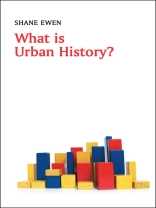Urban history is a well-established and flourishing field of historical research. Written by a leading scholar, this short introduction demonstrates how urban history draws upon a wide variety of methodologies and sources, and has been integral to the rise of interdisciplinary and comparative approaches to history since the second half of the twentieth century. Shane Ewen offers an accessible and clearly written guide to the study of urban history for the student, teacher, researcher or general reader who is new to the field and interested in learning about past approaches as well as key themes, concepts and trajectories for future research. He takes a global and comparative viewpoint, combining a discussion of classic texts with the latest literature to illustrate the current debates and controversies across the urban world. The historiography of the field is mapped out by theme, including new topics of interest, with a particular focus on space and social identity, power and governance, the built environment, culture and modernity, and the growth and spread of transnational networking.
By discussing a number of historic and fast-growing cities across the world, What is Urban History? demonstrates the importance of the history of urban life to our understanding of the world, both in the present and the future. As a result, urban history remains pivotal for explaining the continued growth of towns and cities in a global context, and is particularly useful for identifying the various problems and solutions faced by fast-growing megacities in the developing world.
Table of Content
Acknowledgements
Introduction: Why Urban History?
Chapter 1: The Development of Urban History
Chapter 2: Cities, Spaces, and Identities
Chapter 3: Governing Cities
Chapter 4: Cities and the Environment
Chapter 5: Urban Culture and Modernity
Chapter 6: Transnational Urban History
Suggestions for Further Reading
Notes
Index
About the author
Shane Ewen is Senior Lecturer in History at Leeds Beckett University.












